Augustine and Philosophy
Augustine in Conversation:
Tradition and Innovation
Series Editors: John Doody and Kim Paffenroth
This series produces edited volumes that explore Augustines relationship to a particular discipline or field of study. This relationship is considered in several different ways: some contributors consider Augustines practice of the particular discipline in question; some consider his subsequent influence on the field of study; and others consider how Augustine himself has become an object of study by their discipline. Such variety adds breadth and new perspectivesinnovationto our ongoing conversation witih Augustine on topics of lasting import to him and us, while using Augustine as our conversation partner lends focus and a common threadtraditionto our disparate fields and interests.
Titles in Series
Augustine and Politics
Edited by John Doody, Kevin L. Hughes, and Kim Paffenroth
Augustine and Literature
Edited by Robert P. Kennedy, Kim Paffenroth, and John Doody
Augustine and History
Edited by Christopher T. Daly, John Doody, and Kim Paffenroth
Augustine and Liberal Education
Edited by Kim Paffenroth and Kevin L. Hughes
Augustine and World Religions
Edited by Brian Brown, John A. Doody, and Kim Paffenroth
Augustine and Philosophy
Edited by Phillip Cary, John Doody, and Kim Paffenroth
Augustine and Philosophy
Edited by
Phillip Cary, John Doody,
and Kim Paffenroth

Published by Lexington Books
A division of Rowman & Littlefield Publishers, Inc.
A wholly owned subsidiary of The Rowman & Littlefield Publishing Group, Inc.
4501 Forbes Boulevard, Suite 200, Lanham, Maryland 20706
http://www.lexingtonbooks.com
Estover Road, Plymouth PL6 7PY, United Kingdom
Copyright 2010 by Lexington Books
All rights reserved. No part of this book may be reproduced in any form or by any electronic or mechanical means, including information storage and retrieval systems, without written permission from the publisher, except by a reviewer who may quote passages in a review.
British Library Cataloguing in Publication Information Available
Library of Congress Cataloging-in-Publication Data
Augustine and philosophy / edited by Phillip Cary, John Doody, and Kim Paffenroth.
p. cm. -- (Augustine in conversation)
Includes bibliographical references and index.
ISBN 978-0-7391-4538-8 (cloth : alk. paper) -- ISBN 978-0-7391-4539-5
(pbk. : alk. paper) -- ISBN 978-0-7391-4540-1 (electronic)
1. Augustine, Saint, Bishop of Hippo. 2. Philosophy. I. Cary, Phillip,
1958- II. Doody, John, 1943- III. Paffenroth, Kim, 1966
B655.Z7A89 2010
189'.2--dc22
2009048337
 The paper used in this publication meets the minimum requirements of American National Standard for Information SciencesPermanence of Paper for Printed Library Materials, ANSI/NISO Z39.48-1992.
The paper used in this publication meets the minimum requirements of American National Standard for Information SciencesPermanence of Paper for Printed Library Materials, ANSI/NISO Z39.48-1992.
Printed in the United States of America
Contents
Phillip Cary, John Doody, and Kim Paffenroth
Johannes Brachtendorf
Frederick Van Fleteren
Gareth B. Matthews
Alexander R. Eodice
Phillip Cary
Jesse Couenhoven
Wayne J. Hankey
John Peter Kenney
Paul A. Macdonald Jr.
Roland J. Teske
James Wetzel
John D. Caputo
Introduction
Phillip Cary, John Doody, and Kim Paffenroth
Augustine of Hippobishop, saint, church father, and theologianis also a philosopher. Indeed the word also is misleading, because philosophy is not an add-on to all his other work, but is well-nigh inseparable from everything he does. As he frequently reminds his readers, philosophy means love of wisdom, and in that sense he expects that every worthy impulse in human life will have something philosophical about it, something directed toward the attainment of wisdom. In Augustines own writing we find this expectation put into practice in a stunning variety of ways, as key themes of Western philosophy and intricate forms of philosophical argument turn up everywhere: in the story of his own life in the Confessions, in his writings against his opponents, and even in his sermons to local congregations. The collection of essays in this book examines just a few aspects of the relation of Augustine and philosophy, both in Augustines own practice as a philosopher and in his interaction with other philosophers, both past and future.
We begin by focusing on aspects of Augustines own philosophy. Johannes Brachtendorf begins the collection with an essay arguing that Augustine, when dealing with philosophy, follows two strategies. First he holds on to the idea of philosophy as an endeavor of reason alone. Second he limits the power of philosophy to the realm of reason, as opposed to the will. Philosophy teaches well, but it is unable to convert the human soul. Through this claim Augustine makes room for faith and divine grace as the sole condition for human salvation. With his first strategy Augustine follows the ancient notion of philosophy; with his second strategy he critizes the central idea of ancient thinking that philosophical ethics could be a way to happiness. Augustines view on philosophy as supporting but not replacing faith lived on in Aquinas, Descartes and Kant.
Frederick Van Fleterens essay considers the sense in which Augustine is a philosopher. The distinction between philosophy and theology postdates Augustine by a good eight hundred years. Augustine is philosopher in the etymological sense of the termhe searches for wisdom. According to Augustine the best of ancient philosophy finds its fulfillment in the wisdom of Scripture. Christianity provides the means to attain the end which the best of ancient philosophy saw. The criterion of acceptance of ancient philosophy is harmony with the Bible. Augustine interprets and assimilates his sources into his own original synthesis.
Gareth Matthews then shows how Augustine the philosopher is our contemporary. Augustine introduced the first-person perspective to Western philosophy, responding to the threat of global skepticism with his si fallor sum (If I am mistaken, I exist), which predates Descartess cogito, ergo sum by twelve centuries. His discussion of knowing that one knows anticipates debates today about closure principles for knowledge. His reflections on language acquisition, a priori knowledge, mind-body dualism, intentionalism in ethics, even time and creation, all reflect his characteristic first-person point of view. Moreover, the richly introspective character of his thought makes Augustine seem unexpectedly modern.
Alexander R. Eodice next takes us to Book XI of the Confessions, where Augustine gives an extended philosophical account of the nature of time. There he raises certain puzzles about the measurability and divisibility of time as a kind of physical phenomenon and is seemingly left with the prospect of having to assert the unreality of time. Dissatisfied with this conclusion, Augustine argues that time is real but only as a function of consciousness. Eodice reviews the major strands in Augustines argument and considers three critical responses to it: the first is directed against the arguments opening idea that, given the distinction between time and eternity, time cannot be created in time; the second questions Augustines metaphysical conclusion that time
Next page

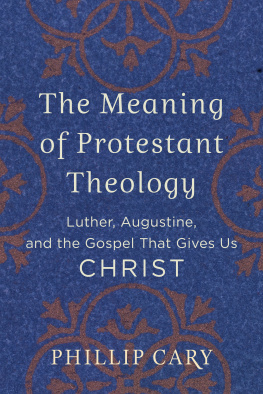
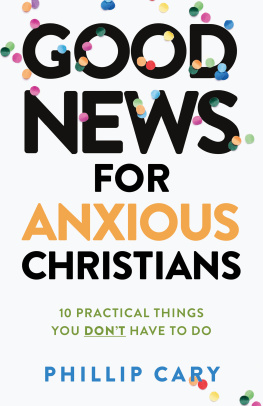
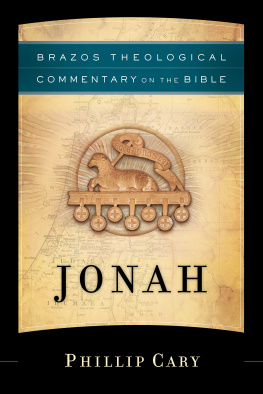
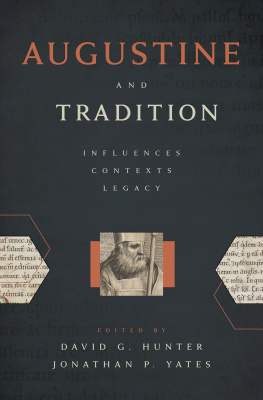
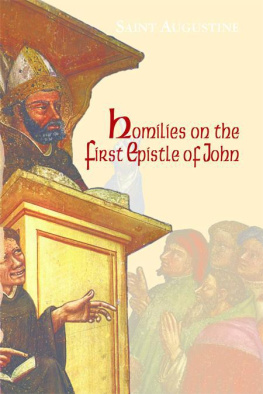
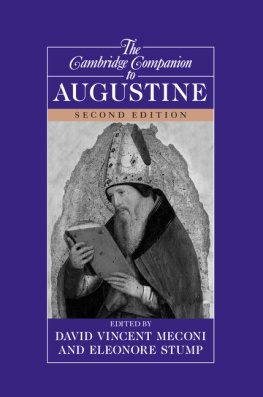
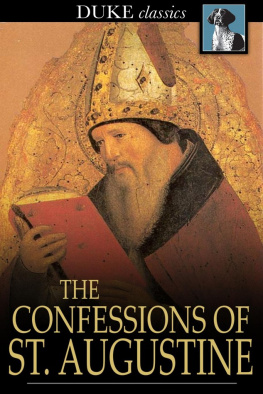
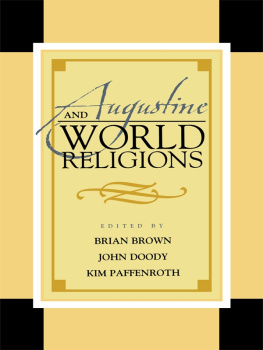
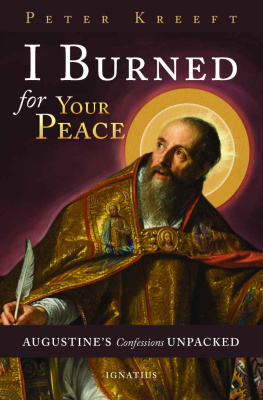
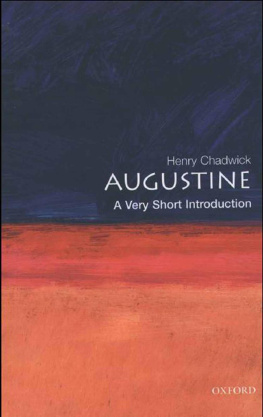
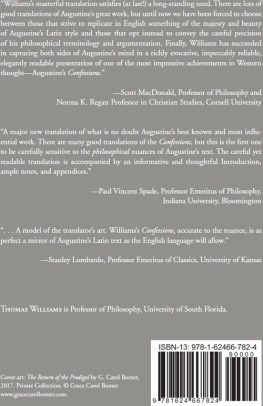
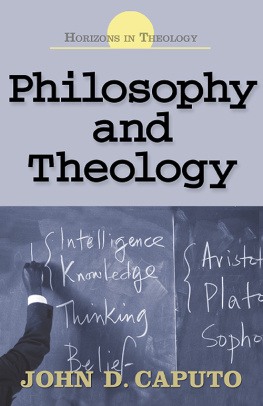

 The paper used in this publication meets the minimum requirements of American National Standard for Information SciencesPermanence of Paper for Printed Library Materials, ANSI/NISO Z39.48-1992.
The paper used in this publication meets the minimum requirements of American National Standard for Information SciencesPermanence of Paper for Printed Library Materials, ANSI/NISO Z39.48-1992.